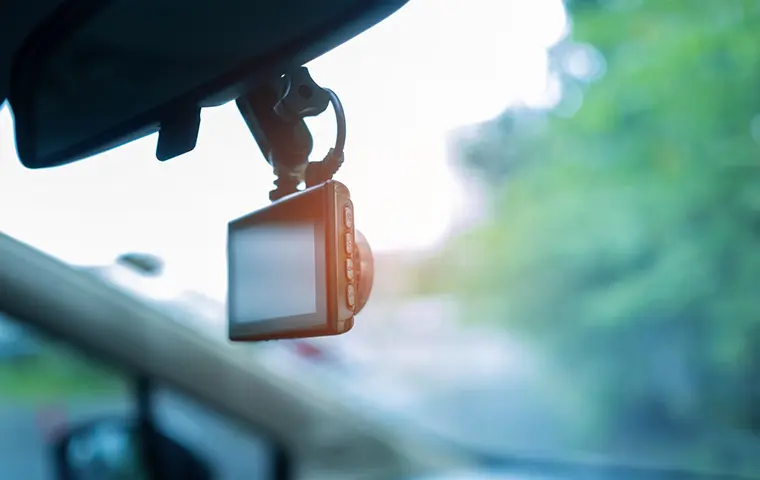Dash cams, or dashboard cameras, are small video-recording devices that have skyrocketed in popularity among drivers. These cameras offer potential benefits, such as:
- Evidence in accidents: Providing crucial footage in determining fault.
- Insurance discounts: Some insurers offer discounts for dash cam users.
- Deterring theft and vandalism: Cameras may discourage criminal behavior.
- Monitoring driving habits: Helping drivers (especially teenagers) improve their driving skills.
While dash cams are valuable, it’s crucial to adhere to Maryland’s regulations governing their use. This article delves into Maryland’s dash cam laws, ensuring you stay compliant and maximize your dash cam’s benefits.
Are Dash Cams Legal in Maryland?
Yes, dash cams are legal in Maryland. There’s no specific statute prohibiting their use. However, there are regulations regarding their placement on your vehicle’s windshield to avoid obstructing the driver’s view.
Placement Restrictions
Maryland law has precise guidelines for dash cam placement:
- AS-1 Line: Dash cams must be mounted above the AS-1 line on your windshield. The AS-1 line is a marking often found near the top of windshields, indicating the area approved by the manufacturer for tinting.
- Top of the Windshield: Cameras can be mounted within five inches from the top of your windshield.
- Bottom Corners: Dash cams can be mounted in a seven-inch square in the bottom corner of the windshield farthest from the driver.
Audio Recording and Maryland’s Wiretapping Laws
Maryland is a “two-party consent” state when it comes to audio recording. This means you must obtain consent from all individuals being recorded before capturing audio with your dash cam. To stay compliant:
- Inform Passengers: Notify passengers that the dash cam is recording audio.
- Disable Audio Recording: Consider disabling audio recording features if you frequently have passengers and are unsure how to properly obtain consent in all situations.
Admissibility of Dash Cam Footage in Court
Dash cam footage is generally admissible in Maryland courts. It can be valuable in resolving accident disputes, traffic violations, or insurance claims.
Here’s why dash cam footage may be crucial in court cases:
- Determining Fault: Footage can provide clear evidence of how an accident occurred, helping to ascertain liability.
- Supporting Your Testimony: Dash cam footage can corroborate your version of events.
- Documenting Damages: Footage can show the extent of vehicle damage and injuries.
Benefits of Using a Dash Cam in Maryland
Dash cams offer several advantages for Maryland drivers:
- Accident Protection: In the event of an accident, footage can help you prove your innocence or demonstrate the other driver’s fault. This can be critical for insurance claims and potential legal disputes.
- Insurance Discounts: Some Maryland insurance companies may offer discounts to drivers who use dash cams since clear evidence helps streamline claims.
- Driving Behavior Monitoring: Dash cams can help parents monitor teen drivers or enable fleet managers to keep tabs on commercial vehicles. This footage can aid in identifying risky driving behaviors and encourage improvement.
- Theft and Vandalism Deterrence: A visible dash cam may make your vehicle a less attractive target for criminals. If vandalism or theft does occur, the camera might capture footage that helps identify the perpetrator.
Potential Drawbacks of Dash Cams
While dash cams are beneficial, it’s essential to consider some potential drawbacks:
- Privacy Concerns: Dash cams can raise privacy issues if they record people without their knowledge or consent, especially when audio recording is involved.
- Distraction: Fiddling with or adjusting a dash cam while driving could be a dangerous distraction. It’s best to set your camera up before beginning your trip.
- Potential for Self-Incrimination: Dash cam footage may capture your own traffic violations or unsafe driving practices.
- Cost: Dash cams range in price, and higher-end models with advanced features can be expensive.
Additional Considerations and FAQs
- Can Police Seize Your Dash Cam in Maryland? Police may seize your dash cam if they have a valid search warrant and believe it contains evidence relevant to a crime.
- Can I Record Police Interactions with My Dash Cam? Yes, Maryland law allows you to record on-duty police officers in public, including during traffic stops and other interactions.
- How Long Should I Keep My Dash Cam Footage? The statute of limitations for personal injury and property damage claims in Maryland is typically three years. It’s a good idea to retain dash cam footage for at least this period, especially if it might pertain to any potential claim.
Sources
- Maryland Department of Transportation, Motor Vehicle Administration
- Maryland Courts Website
- BlackboxMyCar – Dash Cam Laws by State: https://www.blackboxmycar.com/pages/are-dash-cams-legal-in-my-area-dash-cam-laws-in-every-us-state
Disclaimer This article provides general legal information, not legal advice. Laws are subject to change, so always consult current Maryland statutes or speak to an attorney for the most up-to-date and accurate legal guidance.



